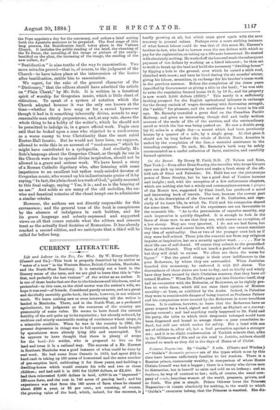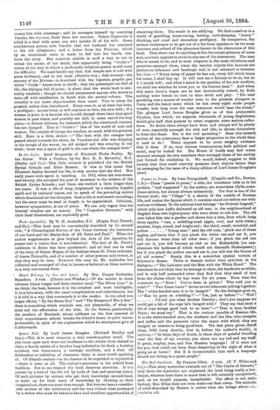Princess Napraxine. By " Ouida." 3 vols. (Ghetto and Windt's.)
—" °aide's" dramatis personm are of the types which must by this time have become sufficiently familiar to her readers. There is a Russian prince, enormously wealthy, in comparison of whom Monte Christo himself was but a beggar ; there is a beauty who drives men to distraction, but is herself as calm and cold as an iceberg ; and an ingenue, by way of contrast to her ; with, of course, the usual corn. pally of roues, heartless women of the world, peasants, priests, and so forth. The plot is simple. Prince Otbmar loves the Princess Napraxine—it counts absolutely for nothing, in the world to which " Onida's " creatures belong, that the Princess is married. She die. misses him with contempt ; and he revenges himself by marrying Ysenite, the ingenue, fresh from her convent. Prince Napraxine is killed in a duel with some one who speaks ill of his wife. Some mischievous person tells Yseulte that her husband has returned to his old allegiance ; and a letter from the Princess, which by an intentional error is made to fall into her hands, con- firms the story. She commits suicide in such a way as not to reveal the secret of her death, this apparently being " Onida's " notion of the way in which a profoundly religions person would meet the difficulty. We need hardly say that this simple tale is told with great brilliancy, and in the moat effective way ; that scenery—the scenery of the Riviera—is described with the vigorous, graphic pen which " Oujda " knows how to wield ; that the personages are full of life, the dialogue full of point; in short, that the whole book is emi- nently readable ; though we should recommend anyone who wants to leave off with satisfaction to finish with the second volume. The morality is not more objectionable than usual. Vice is taken for granted, rather than introduced. Every man is, or at least has been, a profligate ; no one loves, or will continue to love, his own wife ; if a woman is pure, it is because she is cold, though there have been good women in past times, and possibly are still, in some ont-of-the-way place,—a Breton château, for instance, which the nineteenth century has not changed. That is " Ouida's " idea of the world of men and women. The outside of things she touches, as usual, with the greatest skill. Here is a little sketch :—" The boat with the oranges had passed ahead towards the shore, its Venetian-red side was dripping in the trough of the waves, its old striped sail was swaying in the wind ; there was a space of gold in the sun where the oranges were."



































 Previous page
Previous page